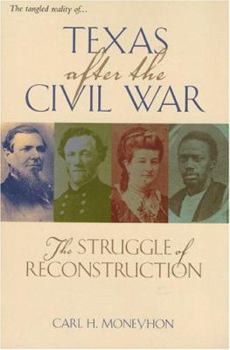Texas After the Civil War
(Part of the Texas A&M Southwestern Studies Series)
Select Format
Select Condition 
Book Overview
As the Civil War ended, the South--and especially Texas, which had escaped the military ravages of the war--stood poised on the brink of a new social, economic, and political order. Congressional Reconstruction, the Freedmen's Bureau, the U.S. Army, and a Republican state administration all presaged change. Nonetheless, Texas in 1874 more closely resembled the Texas of 1861 than anyone might have predicted at war's end. Reconstruction had remade little. In Texas after the Civil War, Carl H. Moneyhon reconsiders the reasons Reconstruction failed to live up to its promise. He shows that the period was not one of corruption and irresponsible government, as earlier studies had argued; nor was the Republican regime of Edmund J. Davis devoid of accomplishments. Rather, the fact that the Civil War had shaken but not destroyed the antebellum community made the resistance to changes in government and society even greater than elsewhere in the South. Moneyhon vividly examines the character of violence in the state, as well as the social and economic forces that shaped the response to Reconstruction. Clearly and engagingly written, masterful in its survey of the last fifty years of research on the era, this book will stand as the definitive synthesis and interpretation of Reconstruction in Texas for years to come.
Format:Hardcover
Language:English
ISBN:1585443611
ISBN13:9781585443611
Release Date:September 2004
Publisher:Texas A&M University Press
Length:248 Pages
Weight:1.30 lbs.
Dimensions:1.0" x 6.5" x 9.6"
Customer Reviews
2 ratings
Let the sun shine in!
Published by Thriftbooks.com User , 15 years ago
There is precious little written about Reconstruction in Texas and the shameful way that history has presented Gov. Edmund Jackson Davis, Radical Republican Governor from 1870-74. This book goes a long way to rehabilitate Davis and discuss many problems that even present day Texans have failed to come to terms with.
Fine overview
Published by Thriftbooks.com User , 19 years ago
Texas After the Civil War could have been a stronger book if it had utilized primary sources more. Nonetheless, Carl Moneyhon's work is a fine overview of the Period between 1865 and 1872 when Democrats regained the state government. Many old Texas histories claim that Reconstruction was an awful experience, marred by bayonet-rule, outrageous behavior by black militia units, and suppression of basic democracy. Moneyhon shows that was not quite the case; interestingly noting that the fall of white voter participation came not from official disenfranchisement, but from unwillingness to participate in post-Confederate government. Politics are covered most thoroughly, but Moneyhon also give space to Republican attempts to develop the Texas economy. The first decade of black freedom is also discussed at some length. Less space is devoted to postwar life for former Confederates. Worth checking out for anyone interested in Texas history or Reconstruction.






